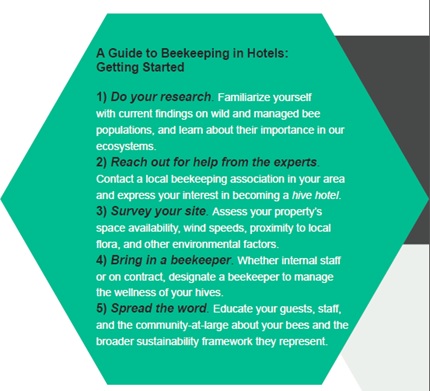 If you frequent Green Lodging News, you are likely someone who appreciates innovative best practices that not only have curb appeal, but also have a real opportunity to occur. The trend in urban beekeeping within the hotel industry might just be slated for that kind of trajectory. Over the past two to three years, we have seen an increase in articles highlighting hotel beekeeping as a growing trend among popular brands, such as Fairmont Hotels & Resorts, Mandarin Oriental and InterContinental to name a few. This trend continues to gain popularity among hoteliers as I have seen myself in the hundreds of hotels I have visited over the past two years tracking practices related to sustainability. So much so that my company, Greenview, conducted a study on urban hotel beekeeping earlier this year. That study is available for download. From the study, we found out several interesting facts and here are a few highlights:
If you frequent Green Lodging News, you are likely someone who appreciates innovative best practices that not only have curb appeal, but also have a real opportunity to occur. The trend in urban beekeeping within the hotel industry might just be slated for that kind of trajectory. Over the past two to three years, we have seen an increase in articles highlighting hotel beekeeping as a growing trend among popular brands, such as Fairmont Hotels & Resorts, Mandarin Oriental and InterContinental to name a few. This trend continues to gain popularity among hoteliers as I have seen myself in the hundreds of hotels I have visited over the past two years tracking practices related to sustainability. So much so that my company, Greenview, conducted a study on urban hotel beekeeping earlier this year. That study is available for download. From the study, we found out several interesting facts and here are a few highlights:
• We identified 55 “hive hotels” that currently host beehives on their rooftops, 66 percent of which began beekeeping in the last three years. (Greenview estimates this number to be larger if we include hive hotels not yet identified by the media.)
• The highest reported beehive is located at 723 feet (220 m) on the 67th floor of the Residence Inn & Courtyard by Marriott New York/Central Park, which is also the tallest hotel in the Western Hemisphere.
• Sixty-seven percent of the surveyed hotels reported that beekeeping was either a profitable or cost-neutral activity.
• None of our surveyed hotels reported a guest has ever been stung by one of their bees.
But beyond the interesting facts our study points out, the most important story to tell was regarding the sustainability behind bees.
Why is Beekeeping Relevant to Sustainability?
Honeybees are known as great pollinators for numerous crops, such as fruits, nuts and vegetables in particular. Nearly one-third of our global food supply relies on the ecological services provided by bees. (University of California-Berkeley, Pollinators Help One-third Of The World’s Food Crop Production, ScienceDaily, 2006.) However in recent years, healthy honeybee populations have significantly declined. This phenomenon is known as Colony Collapse Disorder (CCD). As a result, CCD is now a prevalent issue that threatens the stability of our global food system.
For example, California is a large almond producer that relies on the pollination efforts of bees. An estimated 1.4 million beehives are needed annually for pollination of just almonds in the United States and because of CCD it is common for commercial beehives to be brought in to foster the necessary pollination during each season. According to the latest U.S. studies conducted, there are only 2.5 million managed beehives currently. That’s more than half of the total managed beehives available that are needed just for the almond industry in the US!
There are many potential reasons for CCD—parasites, deteriorating nutrition from declines in plant diversity, pesticide use. (Pollinator Partnership, The North American Pollinator Protection Campaign Scientists Report on Honey Bee Stressors.) But what remains clear is that these possible reasons certainly have to do with the declining sustainable use of our agricultural landscape. Just as we need to understand sustainability as an interconnected issue, we also have to understand that bees play a pivotal role in the interconnected solution.
Why are Hotels Relevant?
The byproduct of honeybees is honey. And who can say no to something as sweet as honey? There is certainly curb-appeal to why hotels have adapted beekeeping on-site. We’ve seen custom cocktails, honey lager beers, honey spa treatments and numerous culinary creations from the harvested honey. But beyond the nuanced culinary and medicinal uses, hotels are also playing up the opportunity to educate their staff and guests on the importance of bees. This is where the story can get interesting and the hotel industry has a chance to rally behind a much larger cause: agricultural sustainability. More importantly, through urban beekeeping, “hive hotels” can help make a positive contribution towards the global solution for CCD. Imagine if the hotel industry could receive recognition for replenishing and restoring much needed colony levels. That would be innovation at work supporting meaningful change.
It Comes Down to the Opportunity Ahead…
As the hotel industry continues to mature and adapt sustainability, what was once considered an innovation is now a best practice. Take for instance the towel/linen reuse program and CFL/LED lighting. We now expect hotels to automatically participate in a towel/linen reuse program and source CFL/LED light bulbs. Ten years ago those same practices would have been considered innovative. That’s progress. And that is how innovations turn into best practices, leaving more room for new innovations to take center stage. I think we’re right at that crossroads for urban hotel beekeeping. It is certainly an innovation, but will it remain a small-scale trend or a lasting best practice throughout the hotel industry? I would like to place my bets on the latter. Especially since even the White House recently announced a $50 million budget to conduct more research and fund more conservation programs for honeybees.
If you own or operate a hotel and would like to consider getting into the business of beekeeping, please consider these steps:

Source: Honey-Sweetened Hospitality: The State of Urban Beekeeping in Hotels. Greenview. 2014.
About Jennifer Moon:
Jennifer is a sustainability consultant at Greenview. She has experience working in corporate ESG reporting, green meetings and industry research for travel and tourism. She has earned a Bachelor of Science degree from the Cornell University School of Hotel Administration and a Master of Science degree from Columbia University in Sustainability Management.
About Greenview:
Greenview was founded in 2008 to play a pivotal role in advancing sustainability through increasing the prevalence of metrics, measurement and reporting. Greenview serves the hospitality, meetings and events, travel, and tourism industries at the organizational level, with core services including Corporate ESG Advisory & Reporting, Sustainable Event Services, Destination Reporting, and Industry Research. For further information visit www.greenview.sg.







